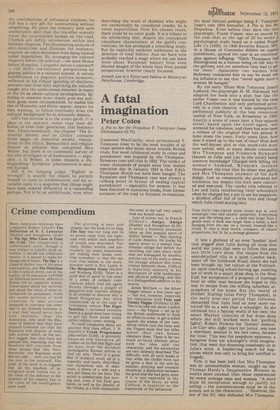Crime compendium
Many American reviewers have compared Robert Littell's The Defection of A. J. Lewinter (Hodder and Stoughton, e2.40) to The Spy Who Came in From the Cold. The comparison is unfortunate since, though it may attract to Littell's book attention it would not otherwise , receive, it is bound to make for disappointed hopes. The Spy is a classical thriller, one of the great masterpieces, and The Defection is like t only in intent, not in, the quality of its execution. Lewinter an American scientist, defects to Russia for. no apparent reason. Uncertainty about his motives, and about the value of what information he possesses, leads the secret services of both countries to take actions designed to convince the other side to act towards Lewinter in a way that would serve their own interests: thus the Americans, who want the Russiansto believe that they have planted Lewinter (so that the Russians will dispose of him) take actions which on the surface suggest that they have not planted him, reasoning that the Russians will conclude from those actions that they hove. Naturally, the Russians work this out and . well, you can fill the rest in for yourself. The point of the story is to suggest that all the mayhem of intelligence work relates not to the value of the defector or the interests of his country but to the rules of the intelligence game itself, The plotting is neat and elegant, but the book is too long. The Spy was not long and its its power came from the tightness with which each sequence of events was described. Too many thriller writers, and particularly too many Americans, are making their books overlong nowadays, so that the sap runs thin indeed in the story. Another such is Roy Lewis in The Hungarian Game (Seeker and Warburg E2.25). There is a good deal of spoof in this story of a series of unlikely coincidences which lead the agent Remby through a jungle of gangsters and contract killings in an attempt to discover why a dead Hungarian has been resurrected: as in the case of Trevanian, whose The Eiger Sanction I reviewed recently there is a good story here trying to get out from under some rather tedious comic writing. No such complaints about yet another first time effort, J. P. Daniels's Crash Programme (Macmillan £1.85). A privately financed new executive jet crashes on its first test flight and the hero, from the Accident Investigation Bureau, arrives to find out why. There is a great deal of technical detail, all of it superbly and easily described, MO mysterious sets of saboteurs, a shrew of a wife and a nice girl friend for the hero. The action is unbelievably fast moving and, even if the final gun battle, as well as the identity of the villains, is a little implausible
the twist in the tail very nearly took my breath away.
Lots of action, too, in Francis Clifford's Amigo, Amigo (Hodder and Stoughton £2.10), in which a freelance journalist takes up that popular sport of thriller heroes — Nazi hunting in Latin America. He tracks his quarry down to a remote Guatemalan village but before the unveiling can take place, both men are kidnapped by bandits, and the rest of the story is about the strange alliance this event creates between them. Clifford is especially masterly in his description of wild landscapes and physical suffering, and this is a distinguished addition to his oeuvre.
James McClure — the Silver Dagger winner a few years ago — has not, however, improved his reputation with Four and Twenty Virgins (Gollancz £1.80). This is an odd tale about a police force — the Virgins — set up by the British underworld to keep its affairs in order. A girl is killed against the wishes of the committee which runs the force and the Virgins must find her killer before their own bosses eliminate them, There is far too
much p0-faced whimsy about both the idea and the characters, and the adventures are very listlessly described. The difficulty with all such books is that while the thriller form can be given a shot in the arm by puzzles, plotting and unusual situations, a distinction between.
the good and the had guys, even if it is one exploded in the course of the story, as with Clifford, is essential to the framework of the adventure.
































 Previous page
Previous page